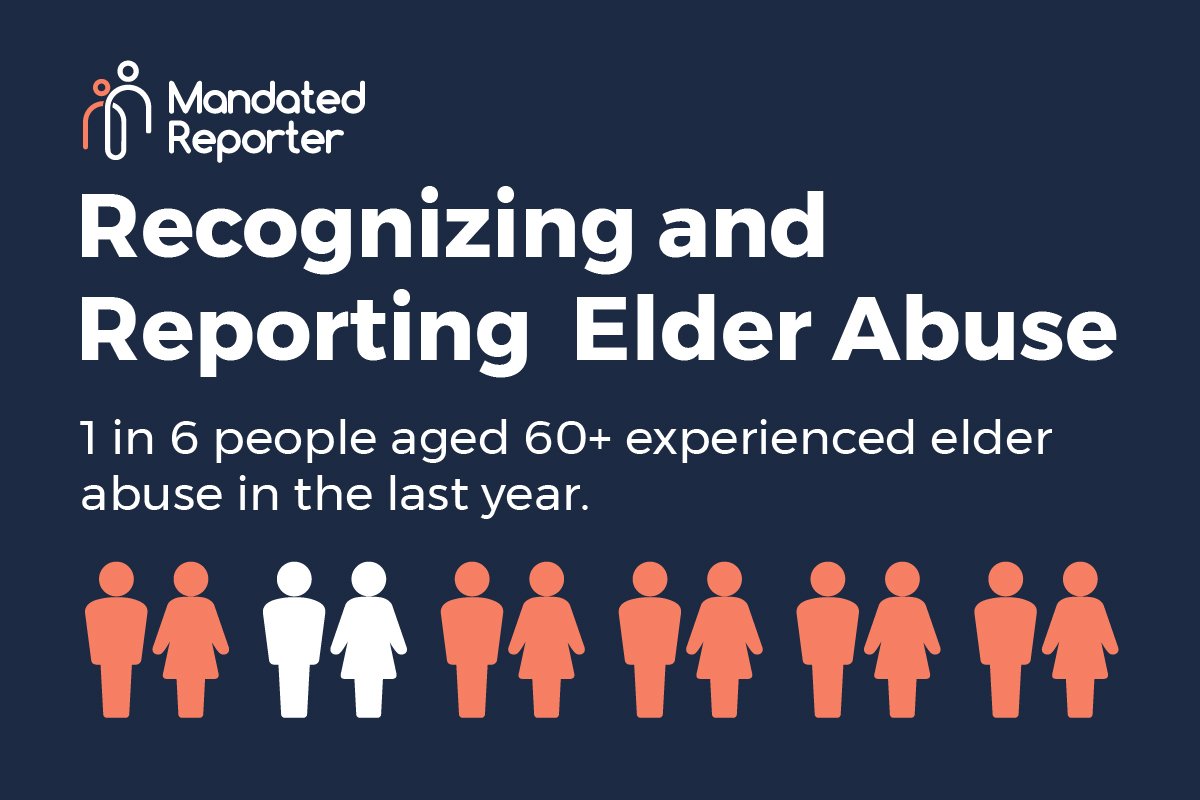If you work in a long-term care facility, you know that the safety and well-being of the seniors in your care is part of your calling. That calling is underscored by a legal obligation to report elder abuse and other crimes so that your patients and residents can receive support.
The Elder Justice Act provides resources and establishes requirements that protect older and dependent adults. Learn more about how this act impacts you as a mandated reporter of elder abuse.
What is the Elder Justice Act?
The Elder Justice Act (EJA), signed into law by President Obama in 2010, provides support and guidance to prevent elder abuse and enable the early detection and intervention of maltreatment.
The EJA established the Elder Justice Coordinating Council, which identifies and proposes solutions to prevent and address elder abuse, neglect, and exploitation. The EJA also provides support for elder abuse, neglect, and exploitation forensic centers.
This act requires that certain employees of long-term care facilities report crimes immediately. It also imposes penalties if an organization or employee retaliates against a mandated reporter for reporting suspected abuse or exploitation, helping to safeguard you as you work to protect your patients.
Elder Justice Reauthorization and Modernization Act of 2023
The Elder Justice Reauthorization and Modernization Act of 2023 (H.R. 2718) aims to refresh and expand the original Elder Justice Act by providing renewed funding for states and tribes to enhance adult protective services and long-term care ombudsman programs.
H.R. 2718 provides funding to help states and tribes recruit, train, and keep frontline workers in nursing homes, home-care agencies, hospices, and other elder-care settings. It also supports Adult Protective Services, long-term care ombudsman programs, and medical-legal partnerships, while funding new community grants to combat social isolation and loneliness among older adults.
For long-term care facilities, ombudsmen, and elder care professionals, the bill means more staff training dollars, stronger abuse-reporting systems, and additional resources to investigate complaints quickly, as well as stiffer protections against retaliation when staff report wrongdoing.
What is the Bill’s Status?
The Elder Justice Reauthorization and Modernization Act of 2023 was introduced in the House in April 2023. As of December 2024, the bill is in the Committee on Ways and Means. No further actions have been taken as of this update.
Follow the bill’s actions here.
Are You Required to Report Elder Abuse?
Employees, managers, agents, contractors, owners, and operators of long-term care facilities are required to report suspected crimes against residents of long-term care facilities. If you work as a nurse or caregiver at these facilities, that means you may be required to report suspected abuse or other crimes against those in your care.
If this applies to you, specific guidelines are in place for how and when you should report. For example:
- Your report must be made within 24 hours.
- If you have reasonable suspicion that the events may cause serious bodily injury, your report must be made within two hours.
- Long-term care facilities that receive federal funding may be penalized for failure to report.
What Are The Consequences for Not Reporting Elder Abuse?
If you fail to meet your requirements as a mandated reporter of abuse or crimes against a resident or patient, you could face serious penalties, including a civil financial penalty of $200,000. This fine may increase to $300,000 if the failure to report increased harm to the victim or resulted in harm to another person.
Failing to report when required can have devastating impacts on you, your employer, and your patients. Because of this, it’s vital to understand your obligations and how to file a report when needed.
Mandated reporter training can be a tremendous help for reporters of elder abuse. Training can help you understand your responsibilities and how to recognize and report elder abuse.
How the Elder Justice Act Could Evolve
H.R. 2718 could have a meaningful impact on your long-term care facility and its patients, providing new training opportunities, options to address social isolation and loneliness, and other benefits.
Seeking out the appropriate training can help mandated reporters of elder abuse safeguard the seniors they care for.
Find out if you are a mandated reporter of elder abuse, whether or not you are required to report elder abuse, and discover more resources for reporters in your state.
FAQs About the Elder Justice Act
Is the Elder Justice Act a federal law or a state law?
The Elder Justice Act is a federal law enacted in 2010 that sets nationwide funding and reporting rules to help prevent, detect, and prosecute elder abuse.
What is the current status of the Elder Justice Reauthorization and Modernization Act of 2023 (H.R. 2718)?
As of December 2024, H.R. 2718 has cleared the House Energy & Commerce Committee and is awaiting action in the House Ways & Means Committee. No Senate companion bill has passed yet.
Does H.R. 2718 change my reporting timeline or duties right now?
No. Your existing federal and state reporting deadlines remain in effect until the bill is passed and implemented. Continue following the current Elder Justice Act reporting timelines.
Who is required to report elder abuse under the Elder Justice Act?
Any employee, manager, agent, contractor, owner, or operator of a federally funded long-term-care facility must report suspected crimes against residents.
What penalties can I face for not reporting elder abuse?
Failure to report can result in civil fines of up to $200,000 or $300,000 if the delay causes additional harm, as well as possible exclusion from federal programs.
How will the 2023 EJA reauthorization help long-term-care facilities?
If enacted, the bill would add billions for workforce recruitment, Adult Protective Services upgrades, ombudsman training, and grants to reduce social isolation, all of which can improve staffing and resident safety.
Where can I track updates on the bill?
You can follow H.R. 2718 on Congress.gov.
Where do I report suspected elder abuse in my state?
Contact your state’s Adult Protective Services hotline first. Phone numbers and online forms are available in the State-by-State Elder Abuse Reporting Directory available at mandatedreporter.com



